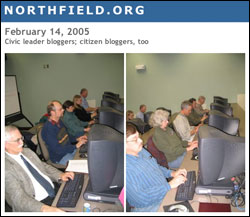By Nathan Alderman, former J-Lab Online Editor
Public officials in Northfield, Minn., have a new way to communicate with their constituents: one blog post at a time.
“I’ve already used my blog to get press releases and photos of suspects out to the community as well as the media,” said Northfield Police Chief Gary Smith. “I’ve been at this for over six months and haven’t run out of ideas yet.”
 Smith and six other Northfield officials are part of Northfield.org‘s Civic Blogosphere Project. It is one of the first efforts by a community news site to actively recruit and train public officials as bloggers.
Smith and six other Northfield officials are part of Northfield.org‘s Civic Blogosphere Project. It is one of the first efforts by a community news site to actively recruit and train public officials as bloggers.
A city councilman, a county commissioner, a local school board member, members of two area planning commissions and Northfield’s state representative all participate in using blogs to keep citizens posted on their daily duties. So do community groups such as the League of Women Voters and Northfield’s Downtown Development Corp.
All these blogs can be found at Northfield.org, a community news blog run by the nonprofit Northfield Citizens Online.
The Civic Blogosphere Project was the brainchild of Griff Wigley, a longtime site volunteer and NCO co-founder. Public response to the 2003 launch of the main Northfield.org blog prompted the idea, Wigley said.
“That turned out to be a big hit,” Wigley said, “so I thought, gee, why don’t we start handing out weblogs to other people?”
During local elections in summer 2004, Northfield.org offered blogs to any candidate running for office. Five candidates accepted the offer and kept blogging after the election.
Betsey Buckheit, a member of Northfield’s planning commission, lost her run for mayor but kept her blog, despite some initial concerns. “I [didn’t] want to simply add to the vast volume of unanalyzed spew out there on the Internet,” she said.
Now, she values her blog’s ability to help her explain otherwise complicated zoning laws and issues in layman’s terms. “Blogging imposes a big responsibility to write well, check facts, and generally do a lot of quality control work,” she said. “This kind of discipline means I have to know my subject and articulate it well, which can only help me to be a better planning commissioner.”
Rep. Ray Cox began blogging after winning election to the state legislature in 2002. Keeping a blog “brings a real human side to politics,” he said.
“I can quickly, easily and inexpensively reach my constituents. I can post questions about things I’m thinking about or working on, and they respond back to me in short order,” Cox said.
Blogging has drawbacks, though. Opponents in Cox’s last election used quotes from his blog in their own campaign literature, he said.
The time commitment makes civic blogging a hard sell to elected officials, Wigley said. “I think what convinces them is when they see how they can leverage what they’re doing.”
A blog helps constituents understand an elected official’s average daily workload and lets the official thank and credit the people whose efforts contribute to his or her work, said Wigley, a self-employed “Weblog coach” who instructs local governments in blogging fundamentals.
Civic blogs are the latest development in NCO’s efforts to foster community online. From the simple electronic bulletin boards NCO launched in 1993 to the “Web café” forum it ran through 2001, the group has experimented with different ways to connect citizens through the Internet.
Today, six volunteers supply the blog with community news, events, photos and questions to spur reader debate. Northfield.org also encourages ordinary citizens to start blogs about local civic life.
NCO supplements its Northfield.org blog with an e-mail listserv in which community members trade views and concerns. NCO regularly invites public officials to join the listserv for in-depth discussions on local policy issues. Northfield.org’s blog publicizes these forums and reports on their results.
Debates on the blog and listserv have helped trigger change on several issues. Concerns about pedestrian crossings for a highway running through town led the city to explore safer options. Debate over a sudden change in buyers for the town’s vacant middle school compelled the new buyer to delay the school’s purchase, allowing time for public feedback. Citizen Warren Ringlien’s complaints about brush burning at Northfield’s compost heap helped end routine burning. Northfield’s mayor later selected Ringlien for the town’s environmental quality commission.
Both the blog and listserv were launched in 2003 from the ashes of a server crash that wiped out the old Web café.
Open-source software and inexpensive hosting allow Northfield.org to cover community news on a very tight budget – about $18 per month, Wigley said. The site uses the MovableType blog platform, the free Mailman and DadaMail programs for its listservs and the open-source Gallery for the popular community photo galleries it added in spring 2004.
“We’ve got thousands of photos up on the site,” Wigley said. “That’s a huge factor in the appeal of the Weblog.”
Traffic for the site has increased dramatically in the past year, Wigley said. Northfield.org had 2,700 unique visitors for the month of January 2004; by January 2005, monthly visitors totaled 9,400. According to Wigley, 950 citizens subscribe to Northfield.org’s weekly e-mail alerts on the site’s top headlines, while the issues listserv has 100 members.
A six-member content committee, including Wigley, moderates discussion on the listservs and maintains the Northfield.org site with news, events, photos and links to posts by Northfield’s civic bloggers. The content committee answers to NCO’s board, whose five members serve one-year terms. According to Wigley, board membership is determined by whoever is interested enough to show up for NCO’s annual meeting.
As Northfield.org grows, NCO’s board members must decide how the site can best serve its community. “There are two main schools of thought,” said Bruce Morlan, a civic blogger, NCO co-founder and current board chairman. “The first is that [Northfield.org] is a blogosphere project with most of the emphasis on community; the second is that it should be an alternative media outlet with reporters and hard news stories.”
Scott Schumacher, a member of the site’s content committee, advocates the latter view. He wants to see Northfield.org become more of an independent news site that might occasionally challenge some of the public officials who are blogging. “There are corners of the community that don’t make it into this forum,” he said.
Board member and content director Rob Brown seeks a balance between the two options. “We know from experience that just providing the forum does not engender much discussion. We need to foster discussion through reporting and moderating [and] identifying citizen journalists,” he said. “NCO needs to develop policies that help our reporters, participants and audience distinguish between facts and speculation.”
NCO could report news and spur discussion even better if it had a bigger budget, Brown said. “Suddenly we’ve started doing something that people notice and care about,” he said. “Yet we lack the organization to really develop it.”
NCO is currently attempting to claim a share of city funding for public-access television, arguing that it provides a valuable community information service. If its bid succeeds, NCO will have several thousand dollars annually to expand its operations.
While the Civic Blogosphere Project is a good start, Brown said the site can do more. “People treat the site as a source for news,” he said. “I’d like to see more forums, more engagement of civic leaders and easier access for people to become involved.”



